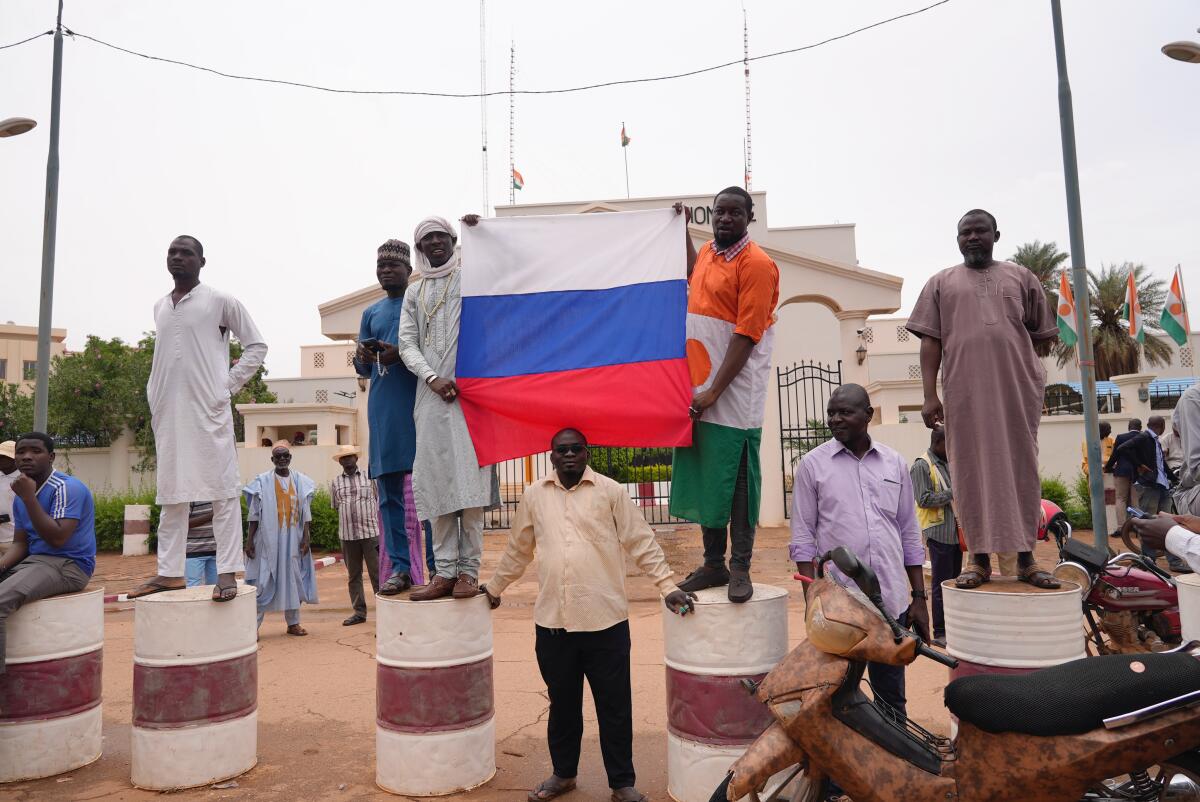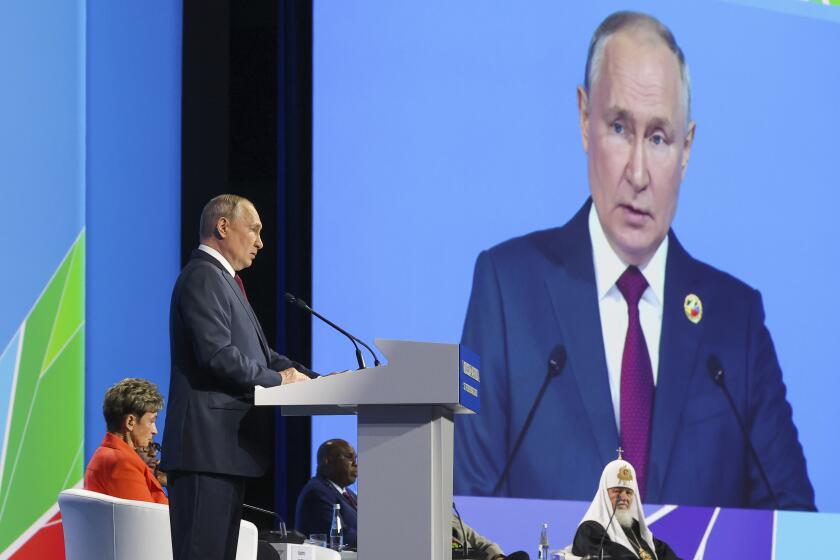Niger’s president vows democracy will prevail after mutinous soldiers detain him and declare a coup

- Share via
NIAMEY, Niger — Niger’s president defiantly declared Thursday that democracy would prevail, a day after mutinous soldiers detained him and announced they had seized power in a coup over the West African country’s deteriorating security situation.
While many people in the capital of Niamey went about their usual business, it remained unclear who was in control of the country and which side the majority might support. A statement tweeted by the army command’s account declared that it would back the coup in order to avoid a “murderous confrontation” that could lead to a “bloodbath.” It was not possible to confirm that the statement was genuine.
Meanwhile, President Mohamed Bazoum — who was elected in 2021 in Niger’s first peaceful, democratic transfer of power since its independence from France and is a key ally of the West — appeared to have the backing of several political parties.
“The hard-won achievements will be safeguarded. All Nigeriens who love democracy and freedom will see to it,” Bazoum tweeted early Thursday morning.
Russian President Vladimir Putin says the fighting in the Zaporizhzhia region of southeastern Ukraine has ‘intensified significantly.’
Foreign Minister Hassoumi Massaoudou issued a similar call on news network France 24, asking “all Nigerien democratic patriots to stand up as one to say no to this factious action.”
He demanded the president’s unconditional release and said talks were ongoing.
U.N. Secretary-General António Guterres, who spoke to Bazoum by phone on Wednesday, said in a statement that he was “extremely worried” about the situation in Niger and warned of the “terrible effects on development” and civilians because of “successive unconstitutional changes of government in the Sahel region.”
The Economic Community of West African States, known as ECOWAS, sent Benin President Patrice Talon to lead mediation efforts.
Bazoum is a key ally in the West’s efforts to battle Islamic militants linked to Al Qaeda and Islamic State in Africa’s Sahel region. Extremists in Niger have carried out attacks on civilians and military personnel, but the overall security situation is not as dire as in neighboring nations.
The fight against extremism in the region has become a major arena in which the West and Russia have vied for influence.
Bazoum was seen by many as the West’s last hope for partnership in the Sahel after Mali turned away from former colonial power France and instead sought support from the Russian mercenary group Wagner. Wagner appears to be making inroads in neighboring Burkina Faso as well.
Western countries have poured aid into Niger, and U.S. Secretary of State Antony J. Blinken visited in March, seeking to strengthen ties. American, French and Italian troops train the country’s soldiers, and France also conducts joint operations.
But the threat to Bazoum has raised concerns that Niger could also turn away from the West.
On Thursday, several hundred people gathered in the capital and chanted support for Wagner while waving Russian flags. Later, they began throwing rocks at a passing politician’s car.
“If Mohamed Bazoum resigns from the presidency, Niger will probably move to the top of the list of countries where the Wagner Group will seek to expand,” said Flavien Baumgartner, an Africa analyst at Dragonfly, a security and political risk consultancy.
Wagner already had its sights set on Niger, in part because it’s a large producer of uranium, sought by Russia. But Bazoum posed an impediment because of his pro-French and pro-Western stance, said Baumgartner.
Wagner’s head, Yevgeny Prigozhin, weighed in on Thursday, describing the developments as part of Niger’s fight against the “colonizers.”
“It effectively means winning independence. The rest will depend on the people of Niger, on how efficient they could govern,” Prigozhin, who led a brief mutiny against the Kremlin last month, said in a statement.
Underscoring the importance of Niger to the West, Blinken said Thursday that he had spoken with the president, saying that he “made clear that we strongly support him as the democratically elected president of the country.”
Blinken, who was in New Zealand, repeated the U.S. condemnation of the mutiny and said his team was in close contact with officials in France and Africa.
On Wednesday morning, members of the presidential guard surrounded Bazoum’s house and detained him.
The mutinous soldiers, who call themselves the National Council for the Safeguarding of the Country, took to state television and announced they had seized control because of deteriorating security and poor economic and social governance in the nation of 25 million people. They said they had dissolved the constitution, suspended all institutions, and closed all the borders.
The coup was reportedly sparked because Bazoum was allegedly planning to fire the head of the presidential guard, Gen. Omar Tchiani, Niger analysts say. Military experts say some of the people who appeared on state TV were high-ranking officers, including Gen. Moussa Salaou Barmou, the head of Niger’s special forces who has a strong relationship with the U.S.
According to someone close to Bazoum who spoke on condition of anonymity because they were not authorized to speak about the situation, the president has not resigned and will not, and is safe in his residence.
In a statement Wednesday, several political parties expressed their support for him, calling the coup “suicidal and anti-republican madness.”
The “country, faced with insecurity, terrorism and the challenges of underdevelopment, cannot afford to be distracted,” they said. Protesters also came out in support of Bazoum that day.
The international community strongly condemned the attempted takeover in Niger, which has experienced multiple coups since independence in 1960.
French Foreign Minister Catherine Colonna tweeted that France “firmly condemns any attempt to take power by force,” she said.
U.N. Human Rights chief Volker Turk called for Bazoum’s release and said “all efforts must be undertaken to restore constitutional order and the rule of law.”
Russia also called for the president’s release, and Foreign Ministry spokeswoman Maria Zakharova said Moscow wants to see “a speedy resolution of this internal political crisis.”
More to Read
Sign up for Essential California
The most important California stories and recommendations in your inbox every morning.
You may occasionally receive promotional content from the Los Angeles Times.














